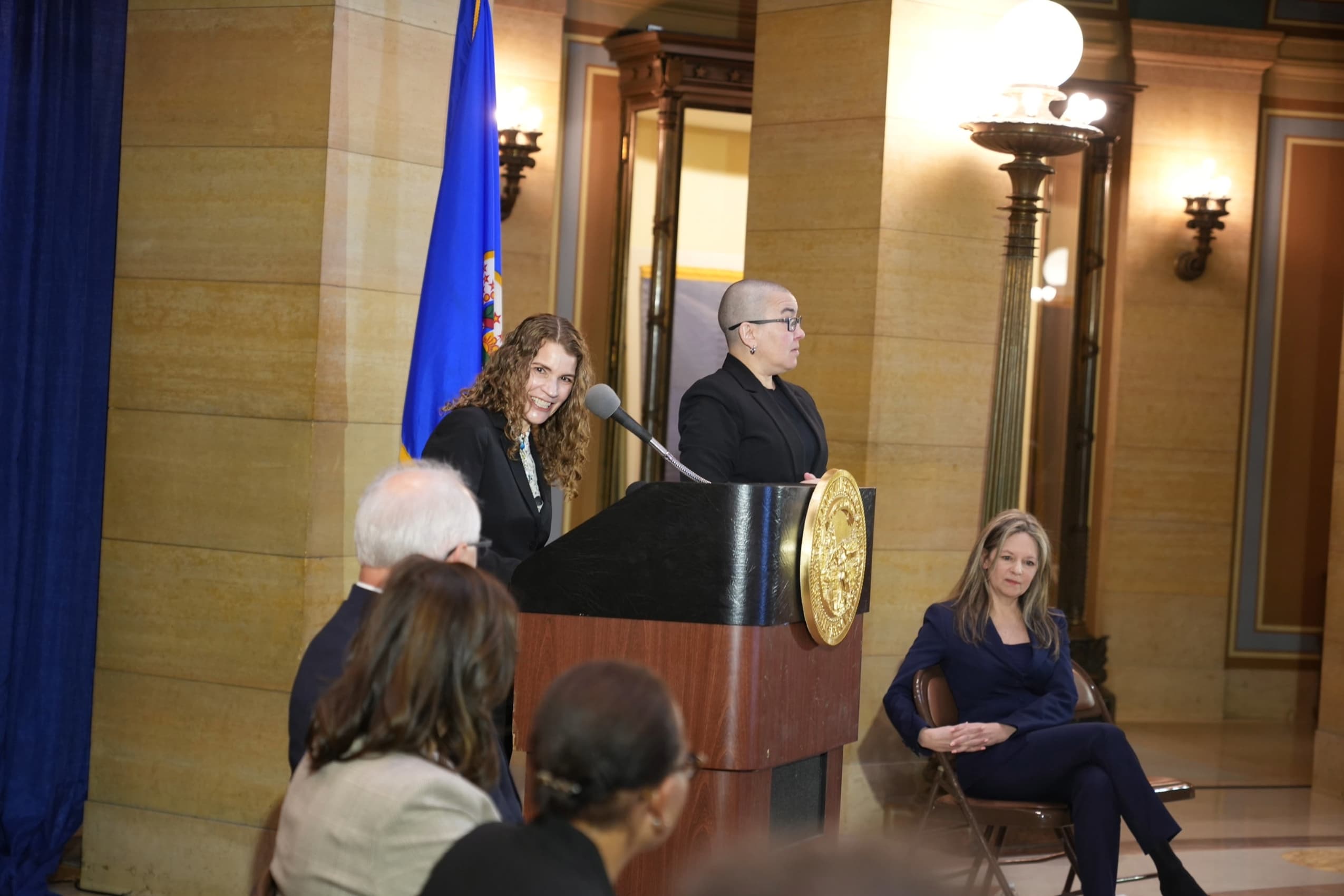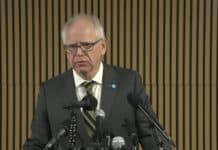
Come Aug. 1, Minnesota’s highest court will feature a panel of seven judges exclusively appointed by Democratic governors.
On Monday morning in the Capitol rotunda, Gov. Tim Walz named Theodora Gaïtas and Sarah Hennesy as his two picks to fill upcoming vacancies on the Minnesota Supreme Court. Both were originally appointed as judges under former Gov. Mark Dayton. Walz selected them from a crop of six finalists he interviewed earlier this month.
Gaïtas, a Minnesota appellate court judge, will replace retiring Associate Justice Margaret Chutich by Aug. 1. Lt. Gov. Peggy Flanagan chimed in on the announcement, and praised Gaïtas for her background as a public defender.
“Judge Gaïtas will be an extraordinary justice who will bring a wealth of life and legal experience to our state’s highest court,” Flanagan said in a press statement. “As a longtime appellate public defender, she will never lose sight of the people behind every decision of the justice system.”
Hennesy, chief judge for the 7th District, will take over for Associate Justice G. Barry Anderson, a nearly 20-year veteran of the Supreme Court and its lone remaining Republican appointee. Gov. Tim Pawlenty named Anderson to the court in 2004. He will step down on May 10. The other six justices on the court have been appointed by either Walz or his DFL predecessor, Dayton.
Walz praised Hennesy’s judicial experience and called her a “leader who knows how to move the needle toward justice.”
“Her greater Minnesota perspective, combined with her passion for service and a deep connection to the people she serves, will make her an exceptional justice on the Supreme Court,” Walz said.
With the picks, Gov. Walz is “reinforcing” the “pro-choice majority” of the court, the Minnesota DFL Party said in a post on X.

Anderson and Chutich announced their retirements within days of each other in January.
The court’s 2023-24 term ends July 31. The base salary for an associate justice to the Minnesota Supreme Court is $206,000.
Changing of the guard under Walz governorship
Chutich, 65, is the first openly gay justice on the state’s highest court. She’s the spouse of Penny Wheeler, who was elected to the University of Minnesota Board of Regents last year by a DFL-controlled legislature.
Anderson, who is set to step down on May 10, will turn 70 in October, the age of mandatory retirement that’s required by Minnesota statute. In his retirement announcement letter to Walz, Anderson said he will step down on May 10. That date is tied to his desire to help preside over a number of attorney bar admission ceremonies before he ends his tenure on the court, Anderson said.
Anderson is considered a “mild Republican” by a Ballotpedia study on partisanship among state supreme court justices. He’s well known in Minnesota Capitol circles for his long-running non-partisan “Your Legislators” television program.
Last fall Walz appointed one of his former employees to the Supreme Court, attorney Karl Procaccini, to fill a vacancy created by the retirement of Chief Justice Lori Gildea (a 2006 Pawlenty appointee).
Procaccini, a self-admitted progressive Democrat with no prior judicial experience, was one of Walz’s chief legal architects of his emergency powers-triggered executive orders that restricted many facets of life for Minnesotans during 2020 and 2021. One of those restrictions was an indoor mask mandate Walz invoked for 10 months that was challenged in state court. He will face the voters this fall and has already launched a campaign website, and has toured the law community in advance of the election.
Hank Long
Hank Long is a journalism and communications professional whose writing career includes coverage of the Minnesota legislature, city and county governments and the commercial real estate industry. Hank received his undergraduate degree at the University of Minnesota, where he studied journalism, and his law degree at the University of St. Thomas. The Minnesota native lives in the Twin Cities with his wife and four children. His dream is to be around when the Vikings win the Super Bowl.











